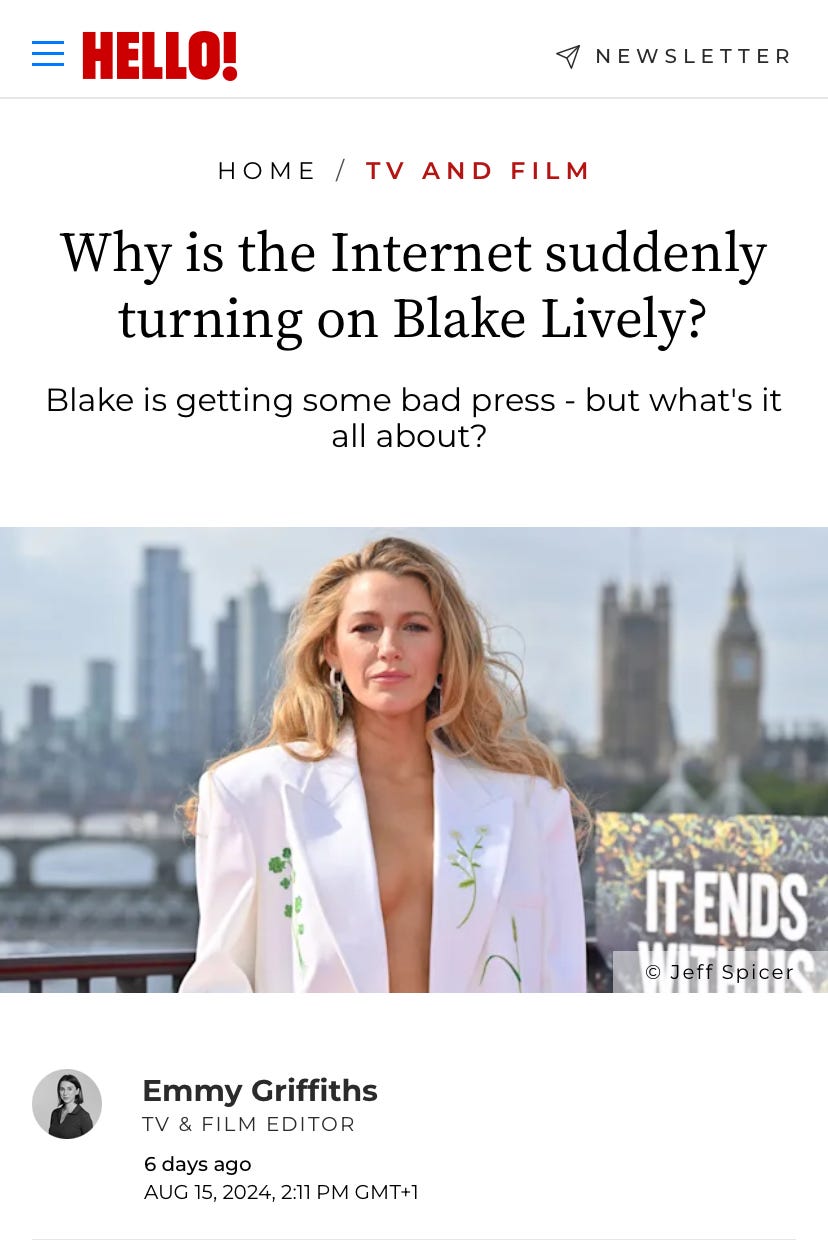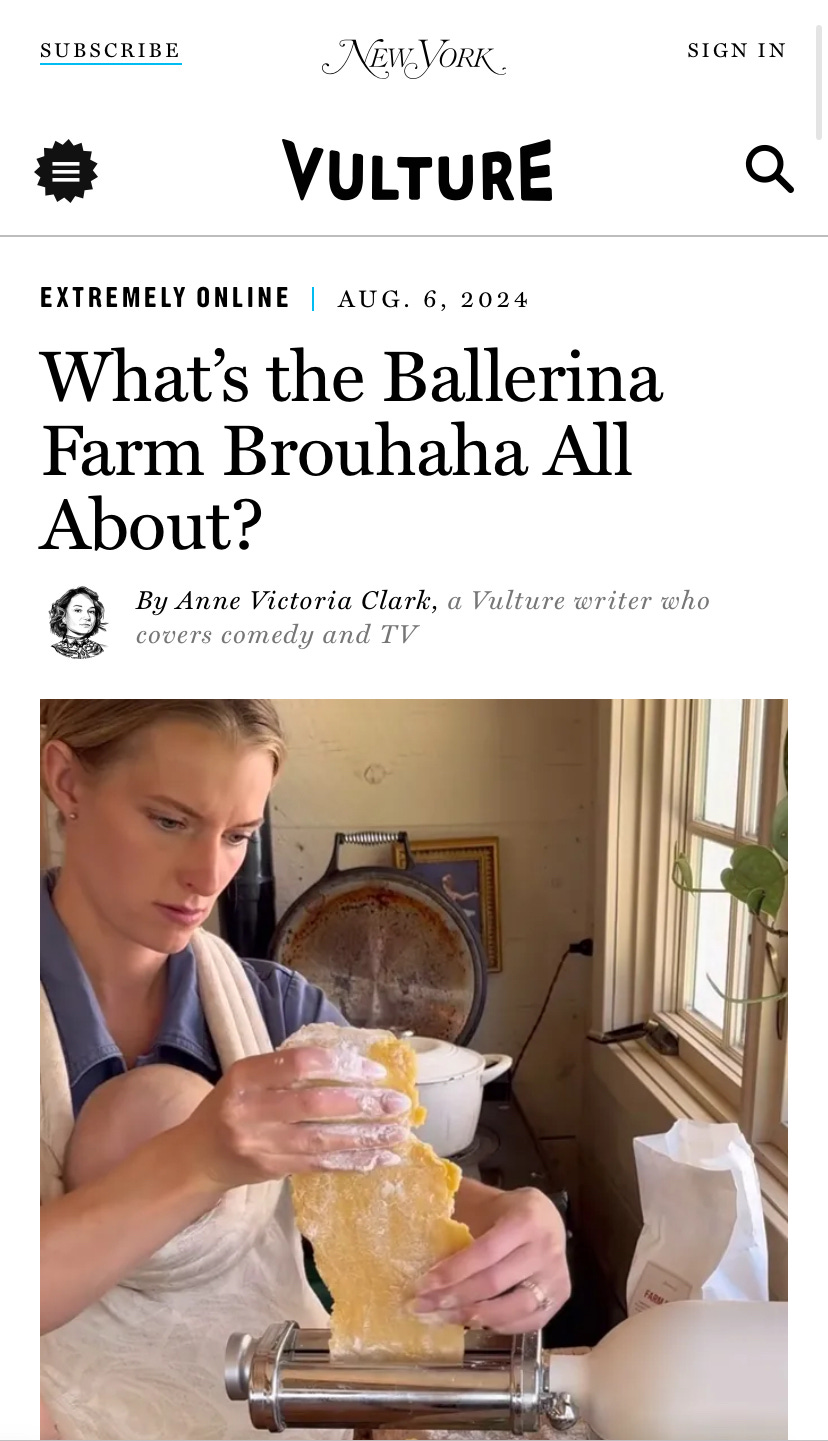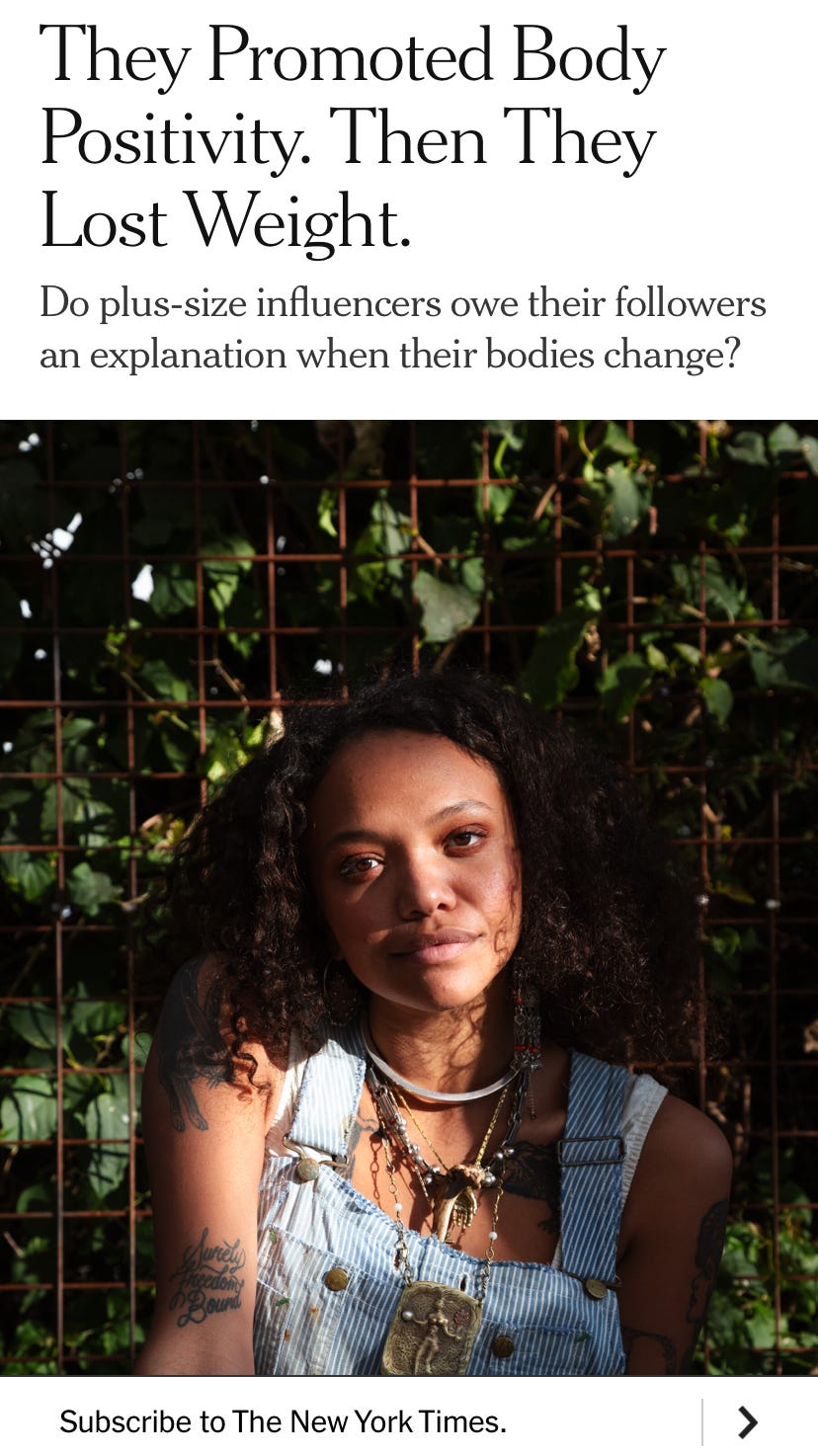The Internet Wants To Cancel Blake Lively
Why this is both terrifying and boring for women, and feeds directly into perfection performance mentality.
Hi friends,
Today we venture to the phantasmagorical realm of celebrity pop culture — an arena in which I am completely unqualified to toss my hat.
Regarding celebrity buzz, I lost all confidence after awkwardly confronting Antonia Kidman in the Double Bay Woolworths, having mistakenly confused her with the neighbourhood barista.
And so ended me “being in the know.”
On the other hand, this latest Hollywood furore encapsulates much of what I wrestle with: womanhood, authenticity, values, pack mentality, a shifting cultural landscape, and the social obsession with facades — beauty, youth and status.
So here I am, attempting to do these thoughts a modicum of justice.
In case you missed it, this week has seen Blake Lively’s meteoric fall from Hollywood heroin to paparazzi putz. I’ll spare you all the details as everyone from TMZ to the BBC has picked up the story, but the Cliffs Notes version includes tone-deaf marketing for her latest film, It Ends With Us, on set drama, and flustered fans realising that Lively seems (gasp) somewhat obnoxious.
Here’s A Brief Rundown On What’s Making Headlines
Shelved as a romance novel with an innocuous blurb, many readers of It Ends With Us were surprised to find themselves embroiled in a story of domestic violence and generational trauma.
The book was adapted to film by director Justin Baldoni and released earlier this month, where the obscure marketing tactics continued. Instead of addressing the story’s most tumultuous and toxic themes, promotion was centred around fashion, flowers, girly gossip and the ethereal glow of Blake Lively’s hair.
Not a good look.
Coupled with several poorly handled media junkets that exude haute couture sarcasm — plus tasteless plugs for her product lines: Betty Buzz and Betty Brown — we find ourselves watching Lively’s rapid fall from grace.
Straight off the bat, I’ll say that I’m disappointed.
We all should be.
It’s estimated that in Australia and the UK, at least 1 in 4 women will experience intimate partner violence in their lifetime and in the US it’s 1 in 3.
These numbers are much higher in countries such as Sudan, South Africa, Afghanistan and more, where fear of reporting domestic abuse and a social-cultural need to “keep it in the family” leaves women at the mercy of gendered systemic violence that seems almost impossible to escape.
So yes, we should call out a multi-millionaire actress who attends movie screenings in a pair of $19,000 jeans when 95% of DV cases involve economic abuse.
Lively had an opportunity with this film to be a conduit for the cause and advocate for victim-survivors.
It was royally bungled.
Mindboggling privileged.
But is that what this is really all about?
Or is an angry digital mob using this publicity trainwreck to justify social aggression against a beautiful, powerful, rich woman?
Without defending nepotism, I feel like I’m watching a trial by social media that would have Lively “cancelled” and it’s leaving a bad taste in my mouth.

Cancel Culture
It’s redundant to say that I condone how Lively is acting, but it’s a sentiment that cuts both ways.
Amongst the heartfelt comments from women genuinely distressed by the frivolous nature of the film’s promotion are thousands more who have joined the conversation to condemn Lively’s mean-girl attitude.
And her “brittle hair.”
And her nose job.
Fans who recently praised her snappy, sardonic quips are now jumping at the opportunity to eviscerate this woman; dredging the archives for every moment Blake Lively was rude as social proof she must be cancelled.
“Cancelled.”
A verb of ending.
Neutralising (often negatively) something that no longer works.
As a kid, we had sporting events cancelled due to inclement weather. A TV show may have been cancelled if it didn’t get enough views. At worst, a birthday party was cancelled when the guest of honour came down with gastro.
But people? They weren’t cancelled.
Confronted, yes. Ignored, sure. Shamed? Unfortunately, so.
Never “cancelled”.
Yet, here it is in the Oxford dictionary, definition #3: publicly boycott or withdraw support from (a person, organization, etc.) for promoting beliefs that are regarded as socially unacceptable.
(Sure, why bother engaging in constructive debate with someone if you can take away their platform or career?)
The promotional campaign for It Ends With Us failed to engage in essential conversations and raise awareness for domestic violence.
It was a squandered opportunity — but was it socially unacceptable?
Sound bites have since resurfaced from interviews, some old / some new, that show Lively as rude and entitled.
Unpleasant, albeit not unexpected, but is it “socially unacceptable?”
Thought: This kind of tedious evidence trawling is in poor taste and further shifts focus away from domestic violence to bog us down in the fallacy of the 1%.
We live in an age of TikTok, AI Porn, addiction to true crime dramas, filtered FaceTunes and Metaverse avatars, loose moral frameworks, and a former President who was elected after admitting he would grab women “by the pussy.”
I then find it frightening how quickly public opinion turned against Lively.
I find it frightening that calls to “cancel” were among the first responses.
And I wonder how many critics weren’t offended by Lively’s floral frivolity but simply waiting for an opportunity to bring her down.
The Female Standard
“As a woman…”
“We must lift women...”
“How can you be a woman and…?”
“You call yourself a feminist…”
It’s not always fun being on Team Woman. Despite calls for solidarity, sisterhood and rising tides that lift all ships, a dark subtext remains.
If our values match. If our politics match. If our lifestyles match. We can be allies.
But if you do something that I don’t like, I will not hesitate to turn on you.
(I’m from Australia. I know all about Tall Poppy Syndrome.)
Women online are calling out Lively’s “gross behaviour towards other women” with gross hypocrisy as they pick her apart like vultures on the highway:
“She [Lively] definitely had some bumps and lumps in the movie. You’d think someone as self-obsessed as her would wait to film after she lost the baby weight.” - @whisperingpineshobbyfarm
“An apology from her is too much to ask. Would not match her cognitive reach.” - @gvs_nat
“I keep coming back to read new [harsh] comments as I am LIVING for this…Say bye bye to your career, Blakey!! :-) :-)” - @shaz.zambala_11
“She has surpassed vile and gone straight to horrible.” - @jilly2727
Armchair activists that go on, and on, and on.
23,076 comments.
10,893 comments.
But she’s not the only one on the receiving end.
Early August poured gasoline on the raging debate around Ballerina Farm, fueled by an article in the Times and the endless dissecting of “cult-trad-wife-life” by a popular writer here on Substack.
Unlike Lively, Hannah Neeman is too perfect. Too capable. Too willing to sacrifice. Too motherly.
People don’t like it.
And we’re supposed to stand by and watch the shaming of plus-sized influencers like Dronme Davis who was publicly slammed for her “disloyalty” to the body positivity movement (sidebar: her weight loss coincided with the return of eating disorders), and Rosey Blair whose critics called her “ableist and self-hating.”
“The plus-size influencer Rosey Blair, who is taking Mounjaro, seemed defiant when she posted: “Full transparency: I have zero remorse or shame for being public about my weight loss. Two years ago, I couldn’t wipe my own ass!”
The tightrope of expectation on which we all walk has been pulled to dizzying heights.
High-performing, public-facing women must advocate, excel, be authentic, be beautiful, be consistent and share the rewards (in a way that will never apply to men).
If they do it, we’ll hate them for it.
If they don’t, we’ll knock them down.
And if they’re mothers, look out! Any wrongdoing becomes proof of their maternal failings in a way that fathers never experience - “You’re a mother! Think of your daughters!”
(The 2023 birth of Robert De Niro’s 7th child to a fourth mother was not quite the cause for scuttlebutt as JLo’s most recent divorce.)
Is It Self-Worth?
But here’s the thing, if I step into my more generous self it would be reasonable to offer up that the issue here lies in personal self-worth.
Those trawling Instagram and TikTok want to be part of something (says the writer who is also inserting herself into the conversation), perhaps because they’re missing it in their lives.
Worshipping at the altar of celebrities and influencers is not the answer, however. At best it’s redundant, at worst, destructive.
People are cringing for being duped — they thought they knew Lively and it turns out they weren’t in on the act.
What does it say to be a mega fan of someone who would do or say something like that? How does that reflect on us?
It might shake core beliefs.
It might cause embarrassment.
But it’s not a reason to turn rabid.
The world feels like it’s itching for a fight and we need to be very careful about weaponising words to get back at people we don’t like.
So while this post started about Blake Lively, it’s actually nothing to do with her and everything to do with us.
Because we CAN hold those with visibility accountable to act in a way commensurate with their influence, without resorting to online snipering and feeding the chaos of cancel culture.
That’s what women do.
See you next time,
Jenn








Great article with some equally great points! I had no idea "cancelled" now has a new definition in the dictionary, what an age we live in.
Ohhhhhh yes this is some bomb ass writing!!!!!! I love your points, you are dead on!! ❤️